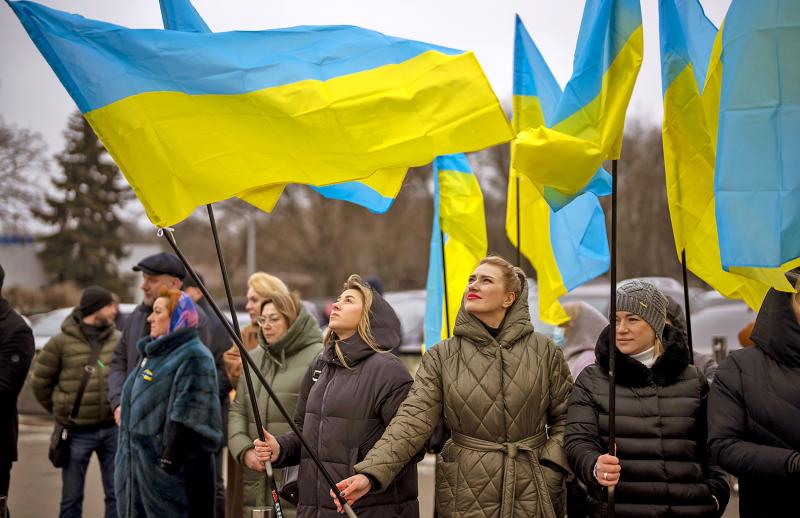China might take advantage of the Ukraine crisis and do something “provocative” in Asia while Western powers are focused on defusing tensions with Russia, a US general said yesterday, although Ukrainians were upbeat yesterday as Russian troops moved away from the border.
Russia’s deployment of more than 100,000 troops had triggered fears in Washington and other Western capitals of a looming invasion.
US Air Force General Kenneth Wilsbach, the head of US Pacific Air Forces, said that China has aligned itself with Russia in the crisis, raising questions about its own intentions in Asia.

Photo: AP
“From the standpoint of will China see what’s happening in Europe and ... try to do something here in the Indo-Pacific — absolutely yes, that’s a concern,” Wilsbach told reporters on the sidelines of the Singapore Airshow. “I do have my concerns that they would want to take advantage.”
“It won’t be surprising if they tried something that may be provocative and see how the international community reacts,” he said.
Based in Hawaii, Wilsbach’s command would likely play a central role were conflict to erupt in the Pacific.
However, later yesterday, reports from Ukraine and Belarus seemed to diminish the threat of a looming conflict.
In Kiev, Ukrainians raised national flags and played the country’s anthem to show unity against fears of an invasion.
The yellow and blue banners fluttered outside schools, hospitals and many shops to mark “Unity Day,” a holiday that Ukrainian President Volodymyr Zelenskiy created this week after Russia massed troops near their shared border.
On Kiev’s main Khreshchatyk Boulevard, where flags decorated government offices, it was business as usual for many.
“Just a normal day, but these flags are here for a purpose, to show we fear no one. They did not scare us,” said Mykola, who operates a small coffee stand in the capital.
Mykhailo Podolyak, an adviser to Zelenskiy’s chief of staff, said this week that the president had chosen yesterday as the patriotic holiday partly ironically, in response to media reports that an invasion could happen then.
In Minsk, Belarusian Minister of Foreign Affairs Vladimir Makei said that “not a single” Russian soldier would remain in the country after massive joint maneuvers near the border with Ukraine.
“Not a single [Russian] soldier or a single unit of military equipment will stay on the territory of Belarus after the drills with Russia,” Makei told a news conference.
The Belarusian Ministry of Defence and Belarusian President Alexander Lukashenko had made this clear, he said.
Russia this week announced an end to some military drills near Ukraine’s borders, including those in Belarus.
“Neither Moscow, nor Minsk, nor Kiev” wants war, Makei said.
In Moscow, the Russian Ministry of Defense released a video showing a trainload of armored vehicles moving across a bridge away from Crimea, which it annexed from Ukraine in 2014.
The Russian ministry said that the movement was part of a return of forces to their permanent bases.
While Washington and its allies continued to express skepticism about Russia’s intentions, the moves nonetheless changed the tenor, although Putin did not commit to a full withdrawal, saying that Russia’s next moves in the standoff with Ukraine would depend on how the situation evolves.
Additional reporting by Reuters and AP

The CIA has a message for Chinese government officials worried about their place in Chinese President Xi Jinping’s (習近平) government: Come work with us. The agency released two Mandarin-language videos on social media on Thursday inviting disgruntled officials to contact the CIA. The recruitment videos posted on YouTube and X racked up more than 5 million views combined in their first day. The outreach comes as CIA Director John Ratcliffe has vowed to boost the agency’s use of intelligence from human sources and its focus on China, which has recently targeted US officials with its own espionage operations. The videos are “aimed at

STEADFAST FRIEND: The bills encourage increased Taiwan-US engagement and address China’s distortion of UN Resolution 2758 to isolate Taiwan internationally The Presidential Office yesterday thanked the US House of Representatives for unanimously passing two Taiwan-related bills highlighting its solid support for Taiwan’s democracy and global participation, and for deepening bilateral relations. One of the bills, the Taiwan Assurance Implementation Act, requires the US Department of State to periodically review its guidelines for engagement with Taiwan, and report to the US Congress on the guidelines and plans to lift self-imposed limitations on US-Taiwan engagement. The other bill is the Taiwan International Solidarity Act, which clarifies that UN Resolution 2758 does not address the issue of the representation of Taiwan or its people in

SHIFT: Taiwan’s better-than-expected first-quarter GDP and signs of weakness in the US have driven global capital back to emerging markets, the central bank head said The central bank yesterday blamed market speculation for the steep rise in the local currency, and urged exporters and financial institutions to stay calm and stop panic sell-offs to avoid hurting their own profitability. The nation’s top monetary policymaker said that it would step in, if necessary, to maintain order and stability in the foreign exchange market. The remarks came as the NT dollar yesterday closed up NT$0.919 to NT$30.145 against the US dollar in Taipei trading, after rising as high as NT$29.59 in intraday trading. The local currency has surged 5.85 percent against the greenback over the past two sessions, central

US Indo-Pacific Commander Admiral Samuel Paparo on Friday expressed concern over the rate at which China is diversifying its military exercises, the Financial Times (FT) reported on Saturday. “The rates of change on the depth and breadth of their exercises is the one non-linear effect that I’ve seen in the last year that wakes me up at night or keeps me up at night,” Paparo was quoted by FT as saying while attending the annual Sedona Forum at the McCain Institute in Arizona. Paparo also expressed concern over the speed with which China was expanding its military. While the US